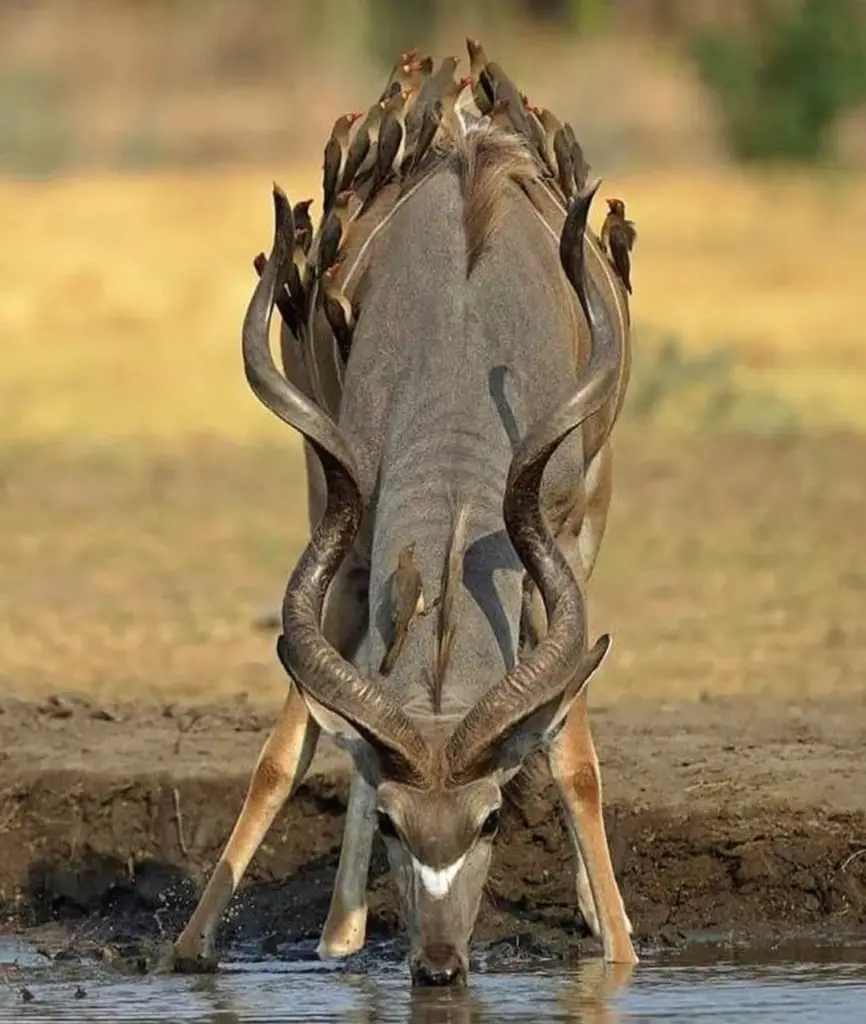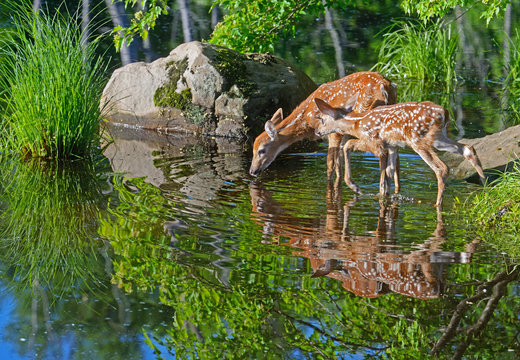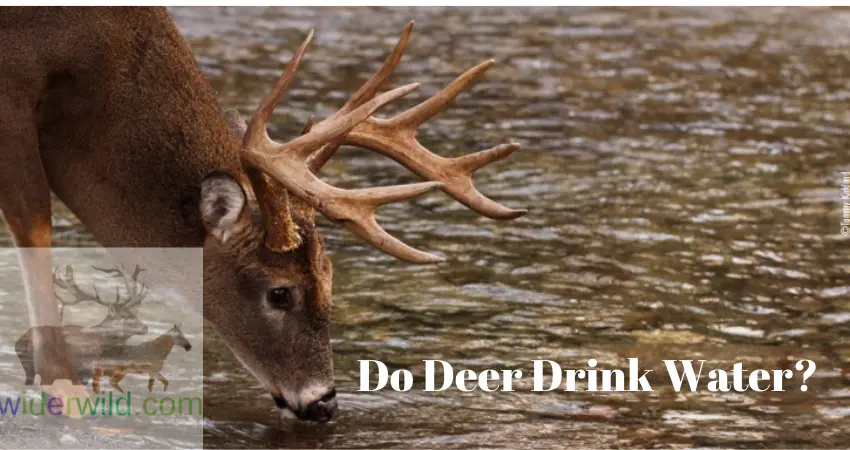Do deer drink water? Yes, deer drink water as a vital part of their daily routine for hydration and survival. Deer, which belongs to the family Cervidae, are herbivorous animals commonly found in various habitats worldwide.
These graceful creatures have a diverse diet consisting mainly of grass, leaves, and twigs. While their diet provides them with a significant amount of moisture, deer still need to drink water regularly to stay hydrated.
Free-ranging deer often rely on natural water sources such as streams, rivers, ponds, and even puddles during the rainy seasons.
Deer living in captivity or in areas with limited access to fresh water may also obtain water from troughs or other artificial sources provided by wildlife management agencies. So, despite their herbivorous diet, deer have a clear need for water consumption.

image credit: beautiful nature
Adapting To Their Environment
Conservation Of Water
Deer, like all animals, need water to survive. In order to adapt to their environment, deer have developed various strategies to conserve water. They are highly efficient at extracting moisture from the plants they eat, which helps reduce their water requirements. Additionally, deer have a keen sense of smell that allows them to locate water sources, even in arid habitats.
In different habitats, deer rely on different water sources. In forested areas, they may drink from streams, rivers, or ponds. In more open habitats, they may use natural or man-made water sources such as lakes, watering holes, or even rainwater collected in tree cavities.
The ability to find adequate water sources is crucial for a deer’s survival, especially during hot summer months when water is scarce. By adapting to their environment and conserving water, deer are able to thrive even in challenging habitats.
Read More: will deer eat dog food
Do Deer Drink Water?
Deer, like all mammals, requires water to survive. They obtain water from various sources, including natural bodies of water such as rivers, lakes, and ponds, as well as rainwater collected in depressions or leaves.
Deer also consume moisture-rich plants, which contribute to their hydration needs. Water consumption by deer can vary depending on different factors, including the seasons and availability of water sources.
During hot summer months, when temperatures rise and vegetation dries up, deer may drink more water to stay hydrated. In contrast, during colder winter months, when natural water sources may freeze over, deer may rely on snow for hydration. Other factors that can affect water intake include the deer’s diet, physical activity, and health status.
Need to confirm that deer have access to adequate water sources throughout the year, especially during periods of extreme weather conditions.
Is Water Life for Whitetail Deer?
Water serves as the lifeblood of all creatures, and whitetail deer are no exception. These graceful animals require water to support various bodily functions, maintain their health, and ultimately, survive. Understanding their water needs is vital for anyone interested in wildlife management and conservation.
How Much Water Do Deer Drink a Day?
Deer are known for their efficient water consumption. On average, a healthy adult whitetail deer may consume anywhere from 2 to 5 liters (or 0.5 to 1.3 gallons) of water per day. This quantity can vary depending on several factors, including the deer’s size, age, diet, and environmental conditions.
Read More: how do deer eat hickory nuts
Meeting Deer Water Requirements
Deer obtain their water from various sources, including:
Natural Water Sources
- Creeks, rivers, and ponds
- Rainwater collected in puddles
- Dew on leaves and grass
Moisture in Their Diet
Deer are herbivores, and their diet consists primarily of vegetation. Plants, leaves, and grasses provide a significant portion of the water they need.
How Do Deer Drink Water in the Winter?
During cold winter months, when natural water sources may freeze over, deer adapt by consuming snow and ice. They can melt snow with their warm tongues, allowing them to access the liquid water content within.
Do Deer Drink Water Like Dogs?
Deer have a distinct drinking method. Unlike dogs that lap up water, deer immerse their mouths directly into the water source, such as a stream or pond. They suck water into their mouths, making it an efficient and relatively quiet process.
How Long Can a Deer Survive Without Drinking Water?
Deer are resourceful animals. They can adapt to their environment and survive without water for extended periods, especially if they obtain moisture from their diet. However, prolonged water deprivation can lead to health issues and affect their overall well-being.
Will Deer Drink Water Out of a Bucket?
In certain circumstances, deer may be hesitant to drink from an unfamiliar source like a bucket. However, with patience and careful placement of water containers, they can be encouraged to use man-made water sources, especially in areas with limited natural options.
Do Deer Drink Water Every Day?
Yes, deer generally drink water every day, but the quantity may vary based on their specific needs and environmental conditions.
This comprehensive guide to whitetail deer’s water needs not only provides insights into their daily requirements but also sheds light on their unique methods of staying hydrated.
Understanding these aspects is crucial for conservation efforts and for those who appreciate the beauty and resilience of these magnificent creatures. Remember, in the world of wildlife, water truly is life.
Alternative Sources Of Water For Deer
Alternative Sources of Water for Deer
For deer, like any other living creature, water is essential to survive. While we typically associate deer with drinking from streams, creeks, and other natural water sources, they have some alternative ways of obtaining water as well.
One way in which deer acquire water is through the plants they consume. Many plants contain a significant amount of water, which can help supplement their hydration needs. As deer feed on leaves, twigs, and grass, they also ingest the water within these plant materials, keeping them hydrated.
Deer can obtain water indirectly through their food. Certain food sources, such as fruits and vegetables, have a high water content, which can contribute to their hydration. While this may not be the main source of water for deer, it can still contribute to their overall hydration levels.
While seeking natural water sources is important for deer, it’s worth noting that they have alternative methods to stay hydrated. The availability of various water sources ensures that deer can meet their hydration needs, even in different environments.

image Credit: stock.adobe.com
The Importance Of Water For Deer
The Importance of Water for Deer
Water is essential for deer as it plays a crucial role in their metabolic processes. It aids in digestion, nutrient absorption, and the elimination of waste products from the body. Additionally, water helps regulate body temperature, especially during hot weather.
During physiological processes, deer lose water through respiration, sweating, and urination. They need to replenish their water supply to prevent dehydration and maintain proper bodily functions. Deer can acquire water from various sources such as rivers, streams, lakes, and even man-made water sources like ponds and troughs.
While deer obtain some moisture from the vegetation they consume, it is not sufficient to fulfill their water requirements. Therefore, they actively seek out water sources and can consume significant amounts per day, especially in warmer months. Access to clean and fresh water is vital for the overall health and survival of deer populations.
Water plays a vital role in the lives of deer, with its importance extending to various aspects of their well-being.
It is crucial for their metabolic processes, as it facilitates the digestion of food, the absorption of essential nutrients, and the elimination of waste from their bodies.
Water serves as a valuable tool for regulating body temperature, a particularly critical function during hot weather.
This natural resource enables deer to stay hydrated and maintain their overall health and vitality in the wild.
Read More: do deer eat wisteria
Strategies For Water Conservation
Behavioral Adaptations: Deer have developed several behavioral adaptations to conserve water. They are typically most active during cooler parts of the day, such as early morning and evening, when water loss through evaporation is minimal.
Deer often seek out areas with high moisture content, such as fields with dew or near water bodies, to minimize their need for direct water consumption. They obtain a significant portion of their water intake from the plants they consume, which can be a source of both hydration and nutrition.
Physiological Adaptations: Deer have evolved physiological adaptations that allow them to efficiently use water. They have a highly efficient digestive system that enables them to extract the maximum amount of moisture from their food. Their kidneys are also adapted to concentrate urine, minimizing water loss through urination.
Rivers And Streams
Deer are beautiful creatures that inhabit various environments, including near rivers and streams. In these areas, access to water is essential for their survival.
When it comes to accessing water in open areas, deer have developed specific strategies. In rivers and streams, they often take advantage of the lower water levels near the banks.
This allows them to access the water more easily and safely. They are efficient navigators, carefully navigating swift currents to quench their thirst.
Deer are also known to make use of natural bridges that may exist, such as fallen trees or rocks, allowing them to cross over water bodies without difficulty. Their graceful movements and agile nature enable them to move swiftly in search of water and navigate various terrains.
So, to answer the question, yes, deer do drink water. They have adapted well to their surroundings and have clever ways of accessing the water they need in open areas, such as rivers and streams.
Ponds And Lakes
Deer need water to survive. Ponds and lakes are frequent sources of water for deer, especially in areas where streams or rivers may be scarce. These bodies of water provide a convenient source of hydration and can also serve as a refuge from predators.
Maneuvering through water plants can be a challenge for deer. Water plants such as lily pads and other submerged vegetation can create obstacles, making it difficult for deer to access the water. Deer are excellent swimmers and are capable of navigating through these plants to reach the water’s edge.
Another obstacle deer may face is marshy ground surrounding ponds or lakes. This soft and muddy terrain can make it challenging for deer to approach the water without sinking or getting stuck.
Deer have adapted to their environment and are equipped with long legs that allow them to traverse such terrain with relative ease.
Deer do require water to survive, and they are capable of reaching ponds and lakes despite the challenges posed by water plants and marshy ground. These adaptations ensure that deer have access to the water they need for hydration and as a vital part of their natural habitat.
Rainwater And Dew
Deer need water while they primarily get their hydration from the plants they eat, they do occasionally consume rainwater and dew as well. Rainwater can provide numerous benefits to deer, as it is often clean and free from pollutants.
It replenishes their water sources during dry spells and can help regulate their body temperature. However, there are also challenges associated with rainwater consumption. Deer must be cautious of standing water, as it can attract predators or be contaminated with parasites.
Deer can take advantage of dew to quench their thirst for rainwater. Dew forms during the night when the air cools and condenses on surfaces, including leaves.
This natural water source can be vital for deer in arid regions or during dry seasons when other water sources may be scarce. Dew can also provide essential minerals for their diet.
While deer primarily rely on plants for hydration, they can utilize rainwater and dew as supplemental water sources when necessary. These natural water alternatives play a crucial role in sustaining the health and survival of deer in different habitats.
Frequently Asked Questions of Do Deer Drink Water?
Do Deer Drink Water?
Yes, deer drink water to stay hydrated and maintain proper bodily functions. They obtain water from various sources such as rivers, lakes, streams, and even rainwater. Drinking water is essential for their survival, especially during periods of drought or when food sources are scarce.
Water helps deer regulate their body temperature and aids in digestion.
Do deer drink fresh water?
Yes, deer do drink fresh water. water is life for everything so, deer is also the same and they typically obtain it by drinking from rivers, streams, ponds, or other sources of fresh water. It is important for deer to have access to clean and fresh water in order to stay hydrated and maintain their overall health.
Do deer like salt water?
Deer typically do not seek out or consume salt water. They primarily drink fresh water from natural sources such as streams, lakes, and ponds. While deer may occasionally encounter salt water near coastal areas, they generally prefer to avoid it due to its high salt content.
Salt water can be harmful to deer if ingested in large quantities, as it can disrupt their electrolyte balance and lead to dehydration. Therefore, it is unlikely that deer actively seek out or have a preference for salt water.
Final Words
Deer do require water to survive, just like any other living being. They obtain water from various sources such as rivers, ponds, and even dew on vegetation. Understanding the importance of water for deer can help us ensure their well-being and conservation.
We can help keep animals alive by making sure that water sources are easily accessible and keeping the environment in good condition.
- Best Oil for Honda Lawn Mower Comparison 2026 Guide
- Best Noise Cancelling Earbuds for Mowing Lawns 2026: Top Picks Reviewed
- Best Oils for Toro Lawn Mowers: A Clear Comparison Guide
- Best Oil for a Lawn Mower 2026: Top Picks for Peak Performance
- Best Shed for Riding Lawn Mower 2026: Top Durable Storage Solutions

